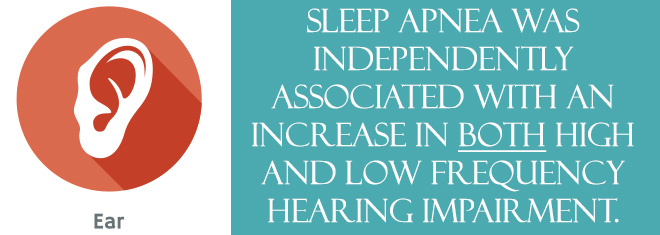
To truly visualize the destructive nature of obstructive sleep apnea, just watch Godzilla destroy Tokyo or watch the Stay Puft Marshmallow Man from Ghostbusters traipse down Central Park West in New York City – trampling cars in its wake. That’s sort of what sleep apnea is doing to your health – your heart, your brain, your sex drive; no facet of your wellbeing is safe. In this latest chapter of sleep apnea versus your health – researchers have found that sleep apnea is related to hearing loss in a major study.
The study, which was recently presented at the 2014 American Thoracic Society International Conference, included nearly 14,000 individuals from a predominantly Hispanic and Latino community. Each participant in the study was given initial tests to determine the severity of sleep apnea using the apnea-hypopnea index, which measures the number of apneatic events per hour. Among the participants, sleep apnea was defined as 15 or more apneatic events per hour. It was also confirmed that all partakers had no other possible causes of hearing loss.
In addition, standards were set to define auditory impairment as a hearing threshold to a low decibel level set at various high and low frequencies. Out of all the patients, 19% had evidence of high frequency hearing loss, 1.5% had low frequency hearing loss and 8.4% had both. Surprisingly, hearing impairment was more severe amongst individuals of Cuban and Puerto Rican descent. Not surprisingly, though, impairment was also more severe in people that had a higher body mass index. Based on all the evidence, researchers surmised that sleep apnea was independently associated with a 31% increase in high frequency hearing impairment, a 90% increase in low frequency hearing impairment, and a 38% increase in both.
Researchers also addressed a lot of questions that they assumed people might have when the study was finally published and presented – like why is the Hispanic and Latin cohort more prone to hearing loss as a result of sleep apnea? – And why is sleep apnea tied to hearing loss in the first place? For this first question, the scientists deduced that therapy for sleep apnea – such as CPAP treatment – is much less likely in this cohort, so the severity of sleep apnea’s ravages are often worse. For the second question, scientists aren’t sure why sleep apnea causes hearing loss – it could be that sleep apnea decreases blood and oxygen flow to the cochlea. Or it could be literal trauma caused by the loudness of excessive snoring.
In the end, Amit Chopra – leader of this study, which was conducted at the Albany Medical Center in New York – mentioned that more tests were required to find out if CPAP therapy could prevent further hearing loss or even repair hearing loss. It was recently discovered that CPAP can reverse brain damage, which should give many people hope. If you have obstructive sleep apnea, there could be a Mothra versus Godzilla battle going on right now in your body, so it is imperative that you start to get serious about CPAP treatment, lest you wind up in shambles.










